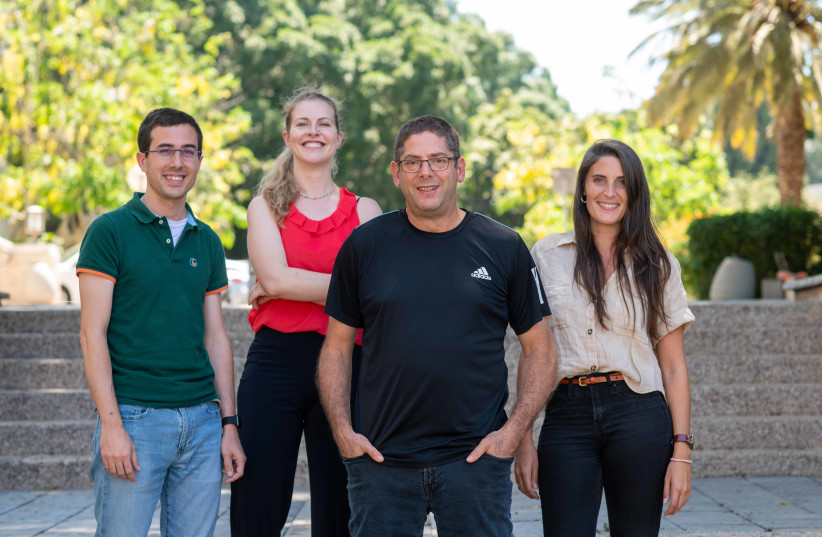Weizmann Institute of Science researchers have shown for the first time that it’s possible to kill inflammation-causing gut bacteria that cause inflammatory bowel disease in a targeted manner – by using viruses called bacteriophages that infect them.
In a study published today in the journal Cell, Prof. Eran Elinav of Weizmann’s systems immunology department and colleagues have proven the feasibility of a potential therapy using phages in this way.
Your gut is more than a tube. It’s home to more than 100,000 trillion microorganisms that participate in the digestion and defense functions of the gastrointestinal tract. Like fingerprints, gut microbiota composition is unique to each individual.
Collectively termed the microbiome, they are considered important to our health, but can also harbor bacteria that contribute to inflammatory bowel disease or other disorders. It is currently impossible to target such disease-contributing bacteria without harming the surrounding beneficial microbes.
Antibiotics kill friendly microbes along with the harmful ones – and also tend to trigger bacterial resistance and have side effects.

Bacteriophages
Bacteriophages – or phages, as these viruses are known – are the most abundant organisms on Earth, found wherever there are bacteria, including in the human gut. Attempts to enlist these viruses in treating infectious diseases go back to the early 20th century, right after they were first discovered, but this line of research was abandoned soon after the advent of antibiotics. In the new study, the researchers used phages to eliminate bacteria that don’t just cause infectious disease but also spur inflammation and gut damage, contributing to inflammatory bowel disease.
There are thousands of different phages, and the major advantage in using them is that each one specializes in attacking a different type of bacteria. The researchers figured out how to target only those gut bacteria that contribute to disease. This is the first “silver-bullet” approach promising a precise suppression of disease-causing gut microbes without harming the surrounding microbiome, according to the Rehovot scientists.
“Our vision is to eventually develop personalized therapies for a variety of disorders, in which the disease-causing strains of gut bacteria will be identified in each patient and a phage cocktail will be designed to kill only those strains,” Elilnav explained.
If the phage cocktail is found to be safe and effective in larger clinical trials, it could become the basis for developing therapies not only to treat inflammatory bowel disease, but also other disorders found to be affected by gut microbes, including obesity, diabetes, neurodegenerative disease and perhaps even cancer.
The study, conducted in collaboration with Prof. Rotem Sorek of Weizmann’s molecular genetics department, was led by postdoctoral fellow doctors Sara Federici, Rafael Valdés Mas and Denise Kviatcovsky from Elinav’s lab, together with Dr. Sharon Kredo-Russo and other researchers from BiomX Inc., a clinical-stage microbiome company advancing novel phage therapies that target specific pathogenic bacteria, based on Weizmann Institute research under exclusive license from Yeda Research and Development Company Ltd., Weizmann’s technology transfer arm.
The process
The scientists started out by identifying the exact bacterial strains that play a role in human intestinal inflammation. They compared the composition of gut microbes in healthy volunteers to that of people with two major forms of inflammatory bowel disease – ulcerative colitis and Crohn’s disease.
In Crohn’s disease, there are healthy parts of the intestine mixed in between inflamed areas, and it can occur in all the layers of the bowel walls. Ulcerative colitis, on the other hand, is continuous inflammation of the colon and affects only its innermost lining.
A detailed computational analysis helped them zero in on several bacterial strains not found in healthy people, which were substantially enriched in patients with the disease, particularly those whose condition was worsening.
The study participants were recruited from four countries in different parts of the world – France, Germany, Israel and the US – to make sure that the results would hold true regardless of location. After identifying several strains of Klebsiella pneumonia bacteria as likely contributors to intestinal inflammation, the researchers confirmed this finding by implanting them into mice used for the study of inflammatory bowel disease. Indeed, the human strains connected to this disease worsened inflammation and intestinal damage in recipient mice.
Next, the researchers screened thousands of phages, selecting about 40 that were most active against the human bacterial strains they had identified as being related to intestinal inflammation. Simply applying the phages would not be enough, since bacteria and phages are involved in a continuous arms race in which the bacteria are constantly developing resistance to the phages. CRISPR, for example, a common gene-editing tool, is based on a protective mechanism that bacteria employ to identify and destroy phage DNA.
The Weizmann scientists used recent insights into the molecular mechanisms of this arms race to give their phages the upper hand against the bacteria; they looked for the ideal combination of phages that would prevent the bacteria from fighting back. A cocktail of five phages was selected based on genetic profiles – structural features revealed through electron microscopy and extensive combinatorial screening for activity against a variety of K. pneumonia strains, including ones resistant to antibiotics. Taken together, these five prevented the emergence of bacterial mutants that could spread resistance.
In a lab dish, the cocktail proved effective in killing K. pneumonia obtained from patients with inflammatory bowel disease. In a subsequent study in mice, it significantly reduced intestinal inflammation and tissue damage caused by these bacterial strains, as well as mortality stemming from the inflammatory disease.
In a lab system simulating the human gut, two representative phages from the cocktail were shown to be stable when used together with antacids. In a follow-up Phase I clinical trial with 18 healthy volunteers, they were found to be well-tolerated. Importantly, the phages persisted and even multiplied in the human intestines over time, while causing no unwanted, off-target changes in the rest of the gut microbes.
